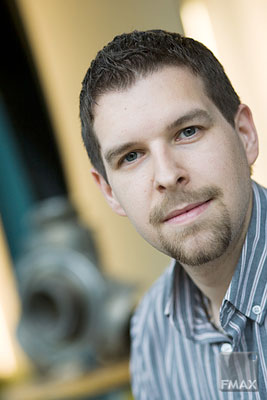The leading edge of a wing contributes to this annoying sound, as this is the first part of the wing that comes into contact with the air. When a plane takes off or lands, the leading edge of the wing commonly deforms, using a slat, which creates an opening between it and the rest of the wing. It is this opening, together with the engines, that generates lots of the disturbing noise.
“Airports are often situated close to very densely populated areas, and therefore it’s important that something should be done about this noise. A special skin for the leading wing edge could help close the opening between this leading edge and the rest of the wing, and hence reduce the loud aircraft sounds. I’m currently performing research to create a flexible skin design that can be applied to a morphing smart high lift device.
“For my design of the skin I’m using composites, because this material can spatially vary in stiffness levels. Some parts of the skin must be stiffer than other parts, depending on, for example, the aerodynamics. Take for instance the tip of the wing: low stiffness would help fold this highly curved section of the skin open, thus achieving an aerodynamically interesting deflected shape. At the same time, the aerodynamics has lots of influence on that part of the wing, and consequently it should also be stiff enough to resist that. This example shows that it’s a balancing act to get the job done. I will also look into how I could optimise the internal mechanism of the wing and new skin.
My research is part of the European project SADE for Smart High Lift Devices for Next Generation Wings. In addition to universities, industry is also participating in this program. And I cherish the contact with industry, because they give valuable feedback. I gave a presentation a while ago about the minimum thickness of one of my skin designs, and someone from industry then told me that it could be certified, but that I must also take into account the effect of a birdstrike. That was a great comment, because I hadn’t thought about that yet. As scientists, we’re sometimes so focused on our research that we forget to think about the application.
“In the next two years I hope to build the skin. It would be great if I could test it in a wind tunnel, in order to check aerodynamic influence, but it’s not yet sure if there’s enough budget and time. It’s not yet clear when exactly a new skin will be available, but hopefully I’ll contribute to developing it, which would mean in the near future the noise of airplanes could be substantially reduced.”
De onafhankelijke journalistiek dreigt van de universiteit te verdwijnen, waarschuwt de universiteitsraad. Die is boos over het besluit en voelt zich gepasseerd. Er is al een website geopend: www.redhetublad.nl. Daar kunnen sympathisanten een petitie steunen voor het behoud van de papieren krant. De teller staat momenteel op meer dan driehonderd handtekeningen in anderhalve dag. Ook enkele redacteuren hebben de petitie al getekend.
Maar niet hoofdredacteur Armand Heijnen, want die staat achter het besluit van de universiteit. Het conflict tussen hem en de rest van de redactie speelt al ruim een jaar, nadat Heijnen bekend had gemaakt dat het papieren blad zou moeten wijken voor een maandelijks personeelsblad, nieuwe media voor studenten en een nieuwsdienst.
Volgens Heijnen blijft hij journalistiek onafhankelijk, ook al zullen zijn redacteuren nu rechtstreeks onder de afdeling communicatie & marketing vallen. “We zijn al jaren onderdeel van de afdeling communicatie en dat blijft gewoon zo. De hoofdredacteur bepaalt straks nog altijd de koers en moet verantwoording afleggen aan een redactieraad. We hebben een redactiestatuut waar de onafhankelijkheid in geregeld is. De website wordt misschien wel onafhankelijker dan ooit.” Ook een woordvoerder van de universiteit wil dat benadrukken: “De redactie kiest in onafhankelijkheid zijn onderwerpen en er is niemand die dat wil veranderen.”
Het is de bedoeling dat medewerkers van de universiteit op de nieuwe website vrijelijk met elkaar het debat aangaan. De website is openbaar, dus iedereen kan de discussies volgen. De taak van de redactie zal vooral zijn om de discussie aan te zwengelen en mensen erbij te betrekken. Berichten schrijven zullen ze minder vaak doen.
Het besluit is genomen om te bezuinigen, zegt Heijnen. Het budget was voorheen “vier à vijf ton per jaar” en wordt nu ingeperkt tot één ton. Vier medewerkers zullen in totaal voor 3,2 fte aan de website werken. Er valt op de redactie één gedwongen ontslag.
“Met name de termijn waarin het besluit er letterlijk doorheen gedrukt wordt, is voor ons onacceptabel”, aldus een verbijsterde Max Patelski, studentlid van de universiteitsraad, op de website van de petitie. “Een universiteit zónder een gedegen universiteitskrant kan zichzelf niet serieus nemen.”
Heijnen gelooft niet dat het felle verzet terecht is. “Onafhankelijkheid is één van de kernwaarden van de Universiteit Utrecht. Zij steekt juist haar nek uit door mensen zo rechtstreeks met elkaar in debat te laten gaan.”



Comments are closed.